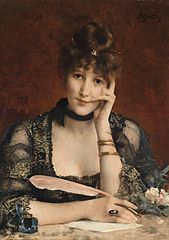In this installment, Auntie Deborah discusses writing a first draft, the unfairness of publishing, and when to run away from a publisher’s contract. 
Dear Auntie Deborah: How can I prevent myself from constantly trying to edit as I draft?
Auntie Deborah: You’re halfway there in understanding why it’s important to plough through that draft so you can look at the whole thing when it’s time to revise. It’s tempting but (for many of us) deadly to halt forward progress and nitpick. Here are a few strategies that have worked for me:
- Beginning each session with reading the last page or so but not making any changes in it.
- Reminding myself that the only draft that counts is the one on my editor’s desk. And that what looks like an error may point me in the direction of a deeper, richer story, so I need to preserve all that drek the first time through.
- Reminding myself about author B, whose work I greatly admire, who told me that no one, not even her most trusted reader, sees anything before her third draft.
- Giving myself permission to be really, really awful.
- Falling in love with the revision process. I can hardly wait to get that first draft down so I have something to play with.
- Writing when I’m tired. Believe it or not, this helps because it’s all I can do then to keep putting down one word after another.
All that said, sometimes editing is the right thing, like when it feels as if I’m pushing the story in a direction it doesn’t want to go, or I’ve written myself into a hole I can’t dig out of. Usually that means I’ve made a misstep earlier, not thought carefully about where I want to go. Or whatever I thought the story was about, I was wrong, and the true story keeps wanting to emerge. How do I tell when this is the case? Mostly experience, plus willingness to rip it all to shreds and start over.
Dear Auntie Deborah: How do you come up with names for your characters?
Often the character herself will suggest a last name, either based in ethnicity or personal traits and history. An aging hippie might have changed their last name to Sunchild or Windflower or Yogananada. A family trying to erase immigrant origins might have a last name like Smith or Jones.
And then there’s the telephone book (do such things still exist?) Or the credits for a really big movie, the ones that go one for screen after screen after screen. Do be careful when using real last names, though. If they’re too different, they might be identifiable. Just use the lists as prompts for your thinking.
Another strategy is to look at first names and then use them as last names. (My middle name is Jean, which was my mother’s last name, so the reverse could also be true.)
That said, always do an internet search for the name you’ve chosen. Even if you aren’t aware of others with that name, it’s good to know.
- There are no quality gate-keepers (or, often editors and proofreaders) for self-published books. Anyone can type up garbage and throw it up on the web.
- Literary quality takes second (or twelfth) place to great story-telling, and great story-telling is in the mind of the reader. Commercial publishers go for what makes money, not what will be read and appreciated a century from now.
- As science fiction author Theodore Sturgeon said, “Ninety percent of everything is cr@p.” One might argue that 99.99 percent is more accurate.
It’s infuriating for authors who pour their heart and soul into a book to make it the very best they can. Alas, it’s also the cold, hard publishing business. But hang in there and keep improving, because someday, an editor will adore your work and shower you with money to buy the right to publish it.
Dear Auntie Deborah: Olympia Press offered me a hybrid contract, but I can’t afford the fee. Am I walking away from a great opportunity?
Hybrid Publisher: There’s some disagreement over whether there actually is such a thing as a hybrid publisher–a company that charges substantial fees yet provides a service that’s otherwise equivalent to traditional publishing, including rigorous selectivity and editing, high royalties, offline distribution, non-bogus PR, and more. Regardless, the term is extensively misused by vanity publishers trying to look more legitimate. Any publisher billing itself as “hybrid” demands further investigation.
Writer Beware goes on to include Olympia in their questionable firms.
Seven Prolific Vanity Publishers (Austin Macauley Publishers, Pegasus Elliot Mackenzie, Olympia Publishers, Morgan James Publishing, Page Publishing, Christian Faith Publishing, Newman Springs Publishing) Austin Macauley Publishers, Pegasus Elliot Mackenzie, Olympia Publishers, Morgan James Publishing, Page Publishing, Christian Faith Publishing, Newman Springs Publishing
Given that there are some wonderful, highly professional small presses who consider unagented material, I can’t understand why you wouldn’t begin with the top traditional publishing markets first.
Continue reading “Auntie Deborah Answers Your Questions About Writing”…
